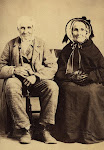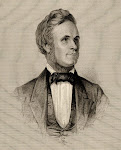by Janet S. Porter
In 1850 and again in 1851, strangers were seen in town—not just any strangers, but men with long coats that were carrying books. Word spread through town that these were missionaries of a strange new church. One of them was Elder William Budge. He had joined the Church on December 31, 1848 in Glasgow, Scotland. Suffering form the poverty common to all in the country, he nevertheless heeded the seeming less charge to leave his work and become a missionary, and at the age of 23 received a call. In April of 1851, he left his family to preach the gospel in the Southampton England Conference (or Hampton), and by the next year was in the Preston Candover District which included the towns surrounding Bradley. “I was now going, a stranger amongst strangers, to preach without purse or script, according to the order of the Kingdom of God.”
Elder Budge had been in these little towns several times with his companion Elder Rostron. Generally they found the town square and preached the gospel as people walked by. Hopefully they would attract the attention of someone in town to whom they could teach the gospel. The neighboring town Wield previously had held rotten eggs and jeering citizens, but it also held the Cox family. Bradley was generally a haven for indifference too. William Neville-Stiff was a practicing deacon of the Church of England, and he knew the Bible well. We don’t know, but it is possible, as an adult, he learned to read with the Bible as his text because he wasn’t able to sign his own marriage license 25 years before. When he heard of the new missionaries, he had not interest in listening to their sermon, but he did suffer from a little curiosity.
“I’ll go to the street meeting.” He told Rachel. “I’ll listen, but if any one of them quotes a passage from the Bible incorrectly, I’ll thrash them within an inch of their life!”
William stood in the chilly spring air and listened to the two elders preach of Joseph Smith and the Restored Gospel of Jesus Christ. Everything they said made sense. Many of his questions were immediately answered. Soon his firm jaw relaxed and he began to listen with his heart. No longer thinking of precise quotations or trick questions, he opened his heart to the fullness of the Gospel. When the Elders finished with their sermon, they had a convert.
William went home to tell Rachel.
She was busy finishing the potatoes for their simple meal. “Rachel, you’ll never guess what I did.”
“I suppose you thrashed those missionaries to within an inch of their life.”
William reddened around the ears. “Well, not really dear. In face I believe what they said is true.”
Rachel looked at him carefully to judge whether he could be telling the truth.
“Why William, I believe you have been converted. Next thing I know, I’ll find you invited them home with you.”
William looked around and caught the eye of Elder Budge who was standing at the side of the house. “Why that’s exactly what I did, Rachel, I invited them for supper and to stay here whatever time they will be in the village.”
“And to they know that we’re having only potatoes for supper?”
Elder Budge presented himself at the door. “Thank you, Ma’am. I would be grateful for potatoes. We have had but little to eat for two days, and potatoes sound very good to us. In fact I grew up in Scotland, and were it not for potatoes, I wouldn’t be here today.”
Several members of the Neville-Stiff family listened and committed to baptism. Whatever they had gone through, Elders Budge and Rostron were well rewarded when in April of 1852 both the Coxs and Stiffs were baptized in the Wield Pond. At least one of the Neville-Stiff children was baptized immediately. We know that Annie and William Jr. were baptized early and it may have been one of them.
A few months following the baptism, Joseph Hyrum was born. His name indicates the wonderful new change in their lives and the already firm testimony of Joseph Smith’s calling to restore the true gospel of Jesus Christ. They now began to look toward emigrating to Zion. However, with ten children to convert and help emigrate, the task would consume the next fourteen years. It is a testament to their family cohesiveness and the powerful influence of the parents that their children joined the Church, though four of the six (Charles, John and Sarah) remained in England.
The Church may have brought spiritual stability into their lives, but domestic stability seemed to elude them. In 1858 when their daughter Annie (Hannah) was married she appeared for the first time on the L.D.S. Church records. William was 54 years old. He is listed in the marriage certificate as a sawyer, sawmill-pretty hard work. A sawyer stood either above or down in a pit at one end of a long saw and sawed half large logs used in building.
William and is 22-year old son, William apparently went to Wolverhampton to work for a time because on December 26, 1858 their Church records were transferred from the Wolverhampton Branch back to the Reading Branch. It appears that the family may have stayed in Bradley because none of them were transferred. Three years later the son of William and his younger brother were again listed as sawyers, so it is quite likely that they went together to do a job. The younger William may have continued to follow jobs because exactly two years later he was married in Surrey, not far from London.
The family lived in Bradley for a few more years, traveling many miles to attend Church meetings each week, and then moved back to Rotherwick. In the 1861 census William was in Rotherwick as an agriculture laborer, which means he and his sons George, 15 and John, 13 hired out to local farmers for a very small wage. The Neville-Stiffs lived on “The Common,” generally land which in early times had been open for all residents as pasture, but which lately had been turned into tenement houses with gardens and a few acres open for cattle belonging to the renters. Clearly, his fortunes were not improving. It is also possible that his earlier family connections were wavered after he joined the Church since ager his baptism his jobs were hard labor.
Although their children had begun to join the Church, William and Rachel seemed to have the closest ties with their daughter Annie and her husband John Cox who were also in the Church. John was working at the time as a ship builder in the port city of Southampton. However he was making plans to immigrate to America, which gave courage to William and Rachel. Possibly with the understanding that they would prepare the way for the Stiffs, John and Annie moved to London during the winter of 1865-66 where their fourth child Heber was born January 14, 1866 in Lambeth, Surrey. Possibly living with her sister Elizabeth and her husband James Smith, they signed on with the ship Caroline which left May 5, 1866.
After the train ride from New York, John and Annie and the tree children came to Wyoming, Nebraska where John purchased a wagon and team. Crossing the plains that summer, they settled in Centerville where he built a house. If William and Rachel were waiting to hear from them, it must have been good news. The good news was that the trip was possible and there would be a house waiting for them when they got there. The bad news may have been that Western America was rough mountainous country. It was nothing like Hampshire, England with its gentle rolling hills and its many tree-lined streams and rivers.
“This, (Hampshire, England) to my fancy, is a very nice country. It is continual hill and dell. Now and then a chain of hills higher than the rest, and those are downs or woods. To stand upon any of the hills and look around you, you almost think you see the ups and downs of the sea in a heavy swell (as the sailors call it) after to what they call, a gale of wind. The undulations are endless, and the great variety in the height, breadth, length and form of the little hills, has a very delightful effect.
Putting all thoughts of their love for homeland behind them, the Neville-Stiffs immediately began to plan for their emigration. No doubt trying to persuade their children to come to America with them, they likely moved in with Elizabeth or with Rachel who had married and was also in London. Rachel was expecting her first child, and no doubt the parting was a tearful one. But apparently neither Elizabeth nor Rachel intended to leave England at that time, and their parents had to go without them. Their only comfort was that their two youngest sons, James, age 18 and Joseph Hyrum, age 15, were with them the day Elizabeth and Rachel walked their parents and two youngest brothers to meet the great ship Hudson at the dock along the Thames River.
Subscribe to:
Post Comments (Atom)









No comments:
Post a Comment